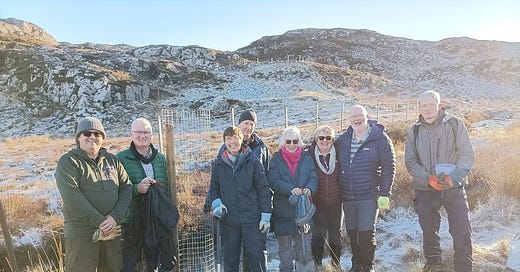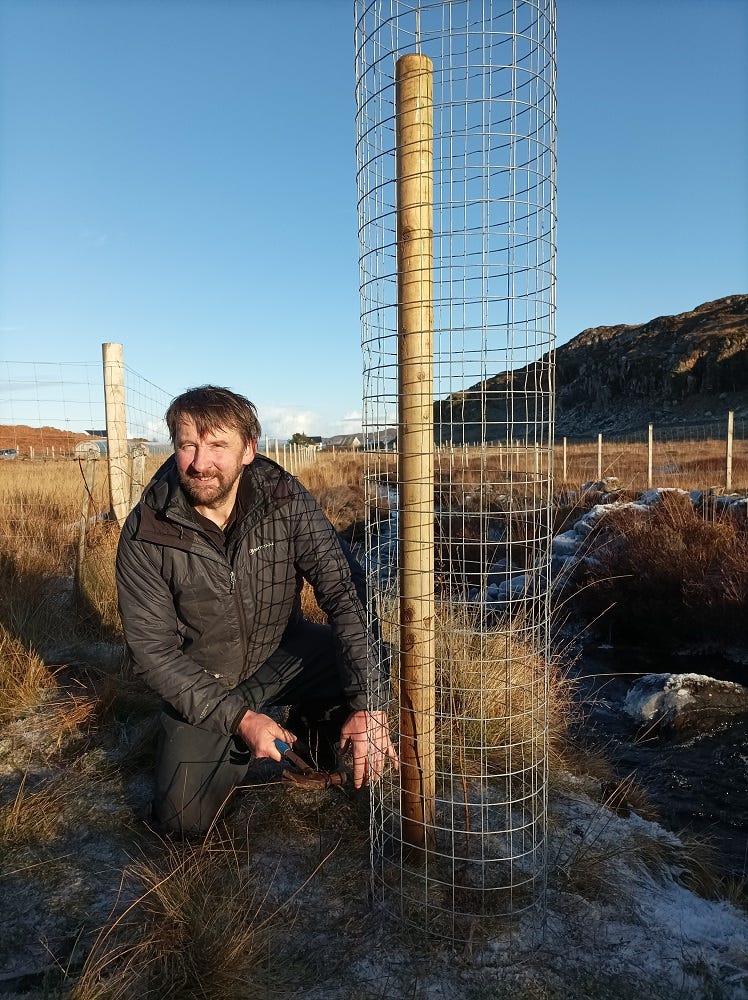Mussels & Fish: Unlikely Allies in Freshwater Survival
Community efforts to help both - Report from Ranger Andy
I'm excited to share with you a story of community, collaboration, and conservation. This year High Life Highland have teamed up with the Assynt Field Club to tackle a pressing environmental challenge: the protection of our precious freshwater pearl mussels (Margaritifera margaritifera).
Let me paint a picture of the problem we face. As climate change accelerates, our summers are getting hotter, and our watercourses are feeling the heat. This spells trouble for the local salmon and trout, who find it increasingly difficult to get enough oxygen in these warmer waters. And here's where our freshwater pearl mussels come into the story.
These remarkable creatures, some over 120 years old, rely heavily on these fish. Freshwater mussels reproduce by releasing larvae called glochidia into the water. These glochidia are unable to swim long distances on their own and need to attach to a host to continue their development. The glochidia latch onto the gills or fins of a suitable host fish. This relationship is highly species-specific; certain mussel species require specific fish species for successful development. The fish provides a mobile habitat for the glochidia, protecting them from predators and carrying them to new locations.
While attached to the fish, the glochidia receive nutrients and oxygen, which are critical for their development. During this time, they undergo a transformation into juvenile mussels. Once they have developed into juveniles, they detach from the fish and settle into the sediment at the bottom of the water body. Here, they continue to grow and eventually become adult mussels.
The relationship between mussels and fish is not just about the mussels' lifecycle. Mussels play a crucial role in maintaining the health of aquatic ecosystems. They filter water, removing particles and pollutants, which helps keep the water clean for fish and other aquatic organisms.

The interdependence of freshwater mussels on fish is a remarkable example of symbiosis in nature. The mussels need the fish to complete their life cycle and spread to new areas, while the mussels contribute to the overall health of the aquatic environment that supports the fish. This interdependency highlights the importance of protecting both mussels and fish, as well as their habitats, to maintain the balance and health of freshwater ecosystems.
Tragically, this summer, as water temperatures soared to lethal levels, we witnessed many of these ancient mussel beds dying.
Faced with this crisis, we knew we had to act. So, with permission from the Assynt Crofters Trust, volunteers from the Assynt Field Club and I embarked on a mission. We resourced and planted willow and alder trees along the watercourses in the region. Why these trees, you might ask? Well, they're excellent at providing shade, and our hope is that, over time, they'll help cool down the water by offering shade and therefore some respite to the fish and, by extension, the mussels.
I must confess, my role in this effort was a bit more symbolic. While the volunteers did the heavy lifting, planting trees and toiling, I was there to support and, admittedly, pose for a few photos once the work was done. But the real heroes are these valiant community volunteers, whose dedication and hard work make all of this possible.
This project is more than just a short-term fix; it's a step towards a sustainable future for our local ecosystem. As the trees grow, they'll form a natural canopy over the water, providing a cooler environment for our aquatic friends. It's a small but significant step in combating the effects of climate change in our little corner of the world.
I want to extend my heartfelt thanks to everyone involved, especially the Assynt Field Club volunteers and the Assynt Crofters Trust. Your hard work and commitment to protecting our environment are genuinely inspiring.
In sharing our story, I hope to encourage others to see the value in local conservation efforts. It's remarkable what we can achieve when we come together for a common cause. We're not just saving mussels; we're preserving a vital part of our natural heritage for future generations. So, here's to many more years of community-led conservation and the enduring beauty of Assynt's natural landscape.
Thanks for reading, and let's keep making a difference together.
Andy Summers, North Highland's Senior Ranger for High Life Highland, is a dedicated naturalist with a deep understanding of the region's diverse ecosystems. His extensive experience in wildlife conservation and passion for preserving North Highland's pristine landscapes make him a vital asset. Andy's work encompasses wildlife observation, environmental education, and passing on a greater appreciation for the area's unique flora and fauna. His commitment to conserving North Highland's natural heritage is evident in his expertise and unwavering dedication.







